 Voters across Europe are set to go to the polls for European Parliament elections on 23-26 May, but how much do citizens really know about how the EU works? Florian Stoeckel presents findings from a new survey of citizens in France, Germany, Italy, Poland, Spain, and Sweden. He writes that while the EU’s democratic deficit is a major debating point in the election campaign, many voters are unaware of existing channels of democratic legitimation and believe the European Commission has the power to overrule the European Parliament and a majority of the member states in the EU’s legislative process.
Voters across Europe are set to go to the polls for European Parliament elections on 23-26 May, but how much do citizens really know about how the EU works? Florian Stoeckel presents findings from a new survey of citizens in France, Germany, Italy, Poland, Spain, and Sweden. He writes that while the EU’s democratic deficit is a major debating point in the election campaign, many voters are unaware of existing channels of democratic legitimation and believe the European Commission has the power to overrule the European Parliament and a majority of the member states in the EU’s legislative process.
Myths about the EU are flourishing in many EU member states. The European Commission lists more than 600 EU myths. Some myths – or, what we call misperceptions – might be more consequential than others. Perhaps this is not surprising: the EU is a complex political system, few citizens interact directly with it, and the media covers EU politics less frequently than national politics.
If voters believe that the European Parliament (EP) does not play an important role for policy making in Brussels, why should they care about EP elections? If one believes that neither the EP nor the member states have any say when it comes to policy making in Brussels, the EU might indeed appear like an undemocratic organisation that steamrolls its member states. The campaigns of Eurosceptic parties are likely to resonate particularly well with voters who hold such views.
Holding misperceptions is quite distinct from being ignorant about a political issue. Voters who are misinformed can be very confident in their knowledge. A large body of research in political psychology shows that voters who hold misperceptions with great confidence are likely to avoid information that challenges their views. And in an age of post-factual politics, it is easy for voters to select into media environments in which misperceptions are confirmed rather than corrected.
We examine citizens’ perceptions and misperceptions with the Exeter EU Misperceptions Survey, a collaboration between the University of Exeter and FactCheckEU. The survey was conducted online and fielded in six EU member states in February 2019: France, Germany, Italy, Poland, Spain, and Sweden. The sample includes about 1,000 respondents per country and resembles the respective populations with regard to gender, age, education, and regional origin. Here I report our results with regard to citizens’ perceptions of MEPs, the role of the EP, and the power of the member states. This is a particularly controversial issue because the EU is criticised for not being particularly democratic. Yet, are European voters actually aware of the existing channels in which they can affect policy making in Brussels?
We asked the respondents of our survey whether they believe that MEPs are directly elected by citizens. On average, three out of five respondents are aware of the fact that voters in each member state elect the MEPs who meet in the EP. One out of five respondents erroneously believe that MEPs are not directly elected by voters. The remaining share of respondents answered “don’t know”. We also see differences between countries: in Germany, only 44 percent of respondents believe that MEPs are elected directly by voters while this figure is 76 percent among Polish respondents.
We also wanted to know whether voters believe that the EP is important when it comes to policy making. We asked respondents if they believe that the European Commission can adopt laws against the will of the EP. Today, nearly all legislation needs to be approved by a majority of MEPs in the EP in order for it to become law. There are only very few situations in which the authority of the EP is limited. Hence, in most cases the European Commission cannot adopt laws against the will of the EP.
To be fair, the institutional powers of the EP have increased over time. About half of the respondents have a roughly correct understanding of the role of the EP: this is the share of respondents who answered that it is wrong or partly wrong to say that laws could be adopted even when the EP objects. Another 27 percent of respondents do not know the answer. This is important to note because these respondents do not hold misperceptions either. There are however 22 percent of respondents who believe it is correct to say that EU legislation can be adopted against the EP, even though this is wrong. The share of respondents who hold this misperception is particularly large in France and Poland.
The phrase ‘take back control’, which was used in the context of the Brexit referendum, made it appear as if Brussels can rule over EU member states without them having much of a say. Yet, laws cannot be passed against the will of a majority of member states. Legislation requires usually more than a simple majority of member states and decisions are commonly taken by consensus. But do citizens perceive Brussels as an organisation that can steamroll member states?
We asked respondents whether they believe that the European Commission can pass legislation even if a majority of member states object. On average, 35 percent of respondents know that the EU cannot pass legislation against the will of a majority of member states. However, 40 percent of respondents erroneously believe that the EU can pass legislation even if a majority of member states do not support it. In France, this erroneous view is shared by half of our sample and it is held by 45 percent of respondents in Poland. On average, only about 25 percent of respondents reported not to know the answer.
Are Eurosceptics the ones who have a flawed perception of the EU while those whose hearts beat for the EU are the only ones who really know how it works? While Eurosceptics are more likely to be misinformed about the EU, the results are not at all black and white. Among respondents who feel cold about the EU, 31 percent of respondents answered our question about the power of the member states correctly. Among those who feel warm about the EU, 40 percent know the role of the member states.
We find a similar pattern when breaking down respondents by their intention to vote in the upcoming elections: 29 percent of respondents who are unlikely to vote in the EP elections are aware of the power of the member states. Among those who definitely want to vote, the share of respondents who are correctly informed about the powerful role of the member states is higher, namely 42 percent. Thus, there is a relationship between someone’s knowledge and position vis-à-vis the EU, but the relationship is not strong.
This is not to say that the EU is or is not sufficiently democratic. However, while the ‘democratic deficit’ of the EU is a topic of heated debates, our results reveal that many voters are not aware of the existing channels of democratic legitimation. In fact, a substantial share of voters are not merely ignorant, but believe that the European Commission could “reign” against the will of the EP and even against a majority of EU member states.
Please read our comments policy before commenting.
Note: This article gives the views of the author, not the position of EUROPP – European Politics and Policy or the London School of Economics. Featured image credit: CC BY 4.0: © European Union 2019 – Source: EP
_________________________________
 Florian Stoeckel – University of Exeter
Florian Stoeckel – University of Exeter
Florian Stoeckel is a Lecturer in Politics at the University of Exeter.


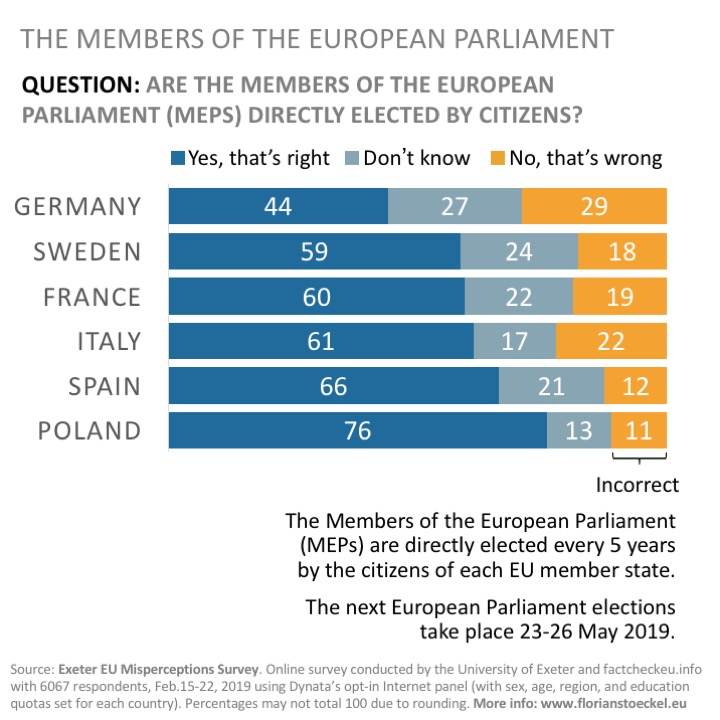
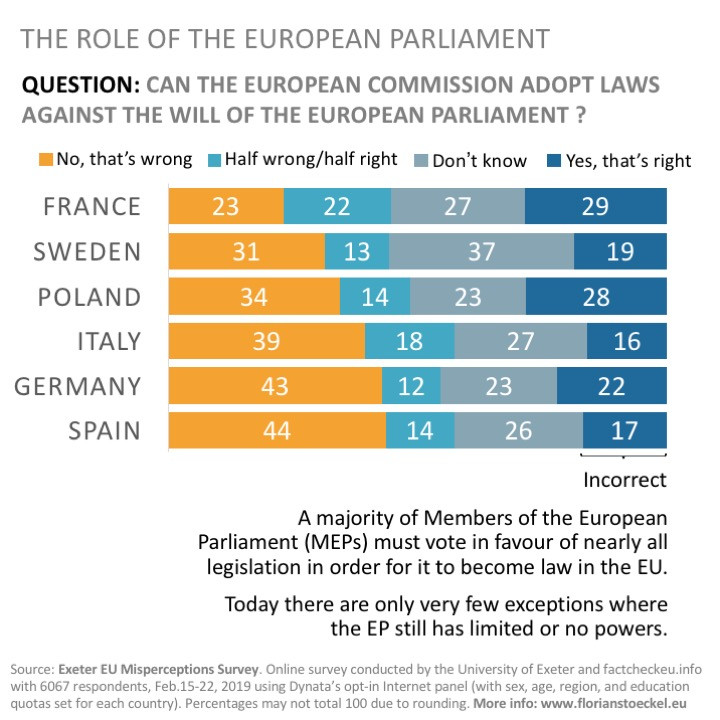
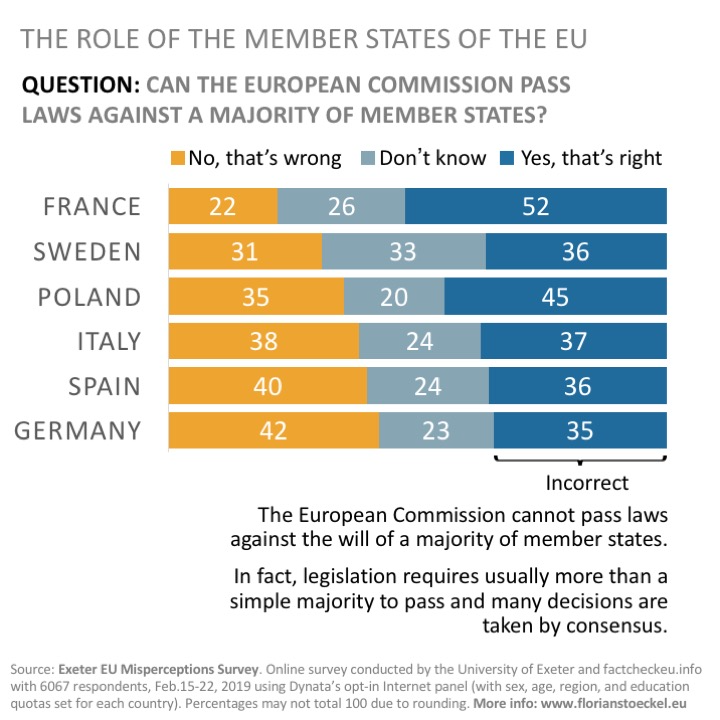
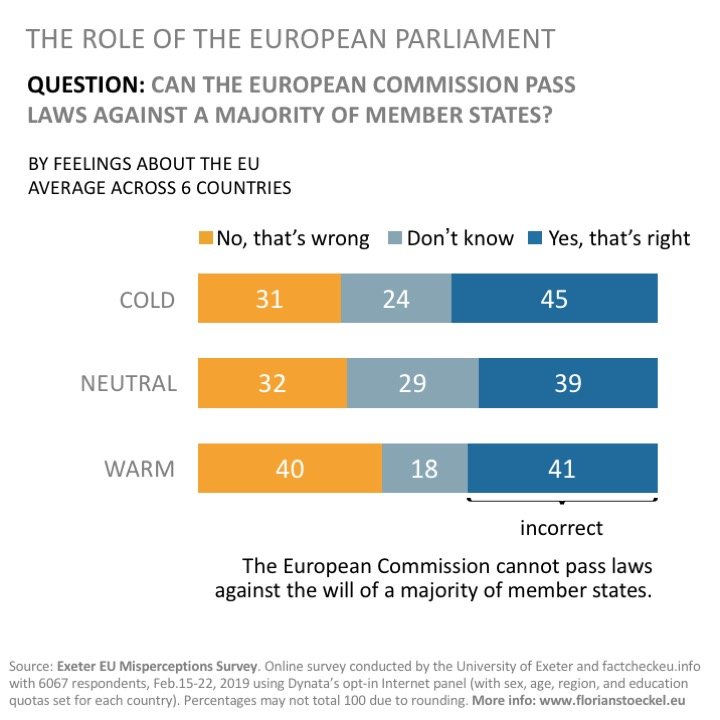


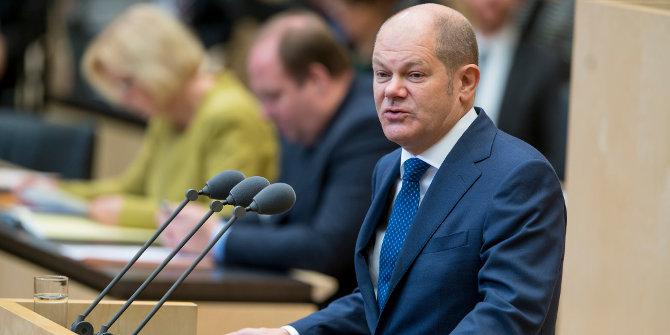
Interesting post. But I had liked a comparison with how much Europeans know about their national institutions.
Found today this tweet about Australia for example:
https://mobile.twitter.com/szarka/status/1129580771688235009
It doesn’t look much better than Europeans knowledge of EU institutions.
Thank you for your comment and the link. Very good point about the national level. I did not have space to discuss this issue, but we asked respondents about their knowledge of national politics precisely to have a reference point. Indeed, levels of knowledge about national politics differ as well between individuals and between countries. I found the focus on the EU most relevant because of those common EU myths, e.g. the EU being particularly undemocratic etc., which is why misperceptions in this context might matter even more than ignorance about national level politics. A few of the results re knowledge about national politics can be found here (very last slides): tiny.cc/70aw6y